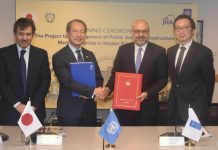ISLAMABAD, FEB 11 (DNA) – The European Commission – the European Union’s executive branch – published the Generalised Scheme of Preferences (GSP) report 2018-19 today. It is accompanied by an assessment of the GSP+ regime granted to Pakistan. The report will be debated and subject to a dedicated resolution by the European Parliament later this month.
The GSP+ is the EU’s trade preference programme for vulnerable developing countries. It grants full removal of tariffs on over 66 per cent of product categories for exports to the EU. The status is based on effective implementation of 27 international conventions on human and labour rights, environment protection and good governance.
High Representative for Foreign Affairs and Security Policy/Vice-President of the European Commission Josep Borrell said: “Trade is one of the crucial tools the EU has at hand to address, support and improve human rights, labour rights and good governance, which are pillars of sustainable development, around the world. Through the EU’s Generalised Scheme of Preferences, we support developing countries to grow and advance in a sustainable way, not least when it comes to climate action. Our preferential trade tariffs help to take thousands out of poverty, to reduce inequalities, and to bring economic growth.”
The report, published every two years, gauges progress of each GSP+ beneficiary country, including Pakistan, in implementing the relevant conventions in order to continue benefitting from GSP+ status. This year’s report highlights progress made in the area of the protection of women and children rights; elimination of honour killings; protection of transgender persons; protection of the environment; and good governance. It however also notes with concerns, among others, the shrinking space for civil society, freedom of expression and media as well as impunity on enforced disappearances.
The GSP+ report is based an annual exchange of information about the beneficiaries’ progress on implementation each of the relevant conventions. Relevant United Nations and International Labour Organisation (ILO) monitoring and supervisory bodies are key sources in this regard. GSP+ countries are encouraged to provide information on their progress and details of future plans.
Pakistan was awarded GSP+ status on 1 January 2014 after the country had ratified 27 international conventions and committed itself to implement them in letter and spirit. Between 2013 and 2018, Pakistan’s exports to the EU increased 51.47%, while EU exports to Pakistan rose 47.22%.
Androulla Kaminara, Ambassador of the European Union to Pakistan, said: “Pakistan has greatly benefitted from the GSP+ status. But there is potential for much more, if the export base is diversified and broadened.”=DNA
=======











